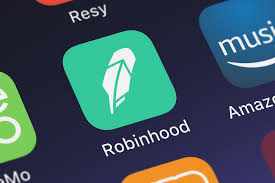Why You Lose Money With Robinhood

Average Rating 4.71 / 5
7 Reviews
5394
Share :
Hi my name is Cameron from Young Money Investments, you can check out my trading mentorship here : https://wetradehq.com/mentors/YoungMoneyInvestments
Founded in 2013, Robinhood has quickly grown to be one of the most notable brokers for new comers to the stock market. The interface of Robinhood is really quite simple, allowing for new traders to not become overwhelmed as easily. It is a mobile app, which is very appealing to many traders who many not be able to sit in front of a computer all day or that just enjoy the simplicity of trading from their smartphone. However, do the negative sides of Robinhood outweigh these small positives?
Robinhood has built it's brokerage on the claims that you will make the most profitable trades by not paying commissions. However, in reality, you are losing money with every trade you make with them. New investors may be drawn to use Robinhood on the basis that there are no commission costs, and it is a very easy app to use, but we want to warn traders and investors of the hidden ways Robinhood is in actuality, losing you money!

The Reality
Many traders and investors truly believe that Robinhood is completely, 100% free. By offering trades with zero commissions, the brokerage is catering to new traders and people that are just starting out. You can trade most common publicly traded companies on Robinhood, which is very appealing to many traders. After using this brokerage for some time, however, you realize that while you may not be paying commissions for your trades, your orders are not be filled as efficiently as other brokerages, causing you to lose money. Many brokerages are very fast at filling orders, within fractions of a second after you place the order. Since Robinhood is free, they aren't as concerned with the speed in which your orders are filled, giving them time to search out the highest bidding market maker to fill your order. Basically, your order information is sold to high frequency trading (HFT) companies that will buy shares of a stock at a lower cost then your bid price and then turn around and sell them to you at your bid price milliseconds later. By not filling orders immediately, you will be losing out on potential lower entries, or higher sells, thus costing you money.
For example:
If you place an order for 100 share of $ROKU at $100/share, Robinhood sells that information to HFT's. The HFT then waits for the price to drop below $100/share and buys 100 shares immediately. Let's say that price is $99.90/share. The HFT then immediately sells the 100 shares back allowing Robinhood to fill your order and, allowing the HFT to profit $0.10/share. You end up paying $0.10 more than what the lowest actual price per share was. So for the 100 shares you bought which should have been at fair market price, you end up paying $10 more for that trade. Multiply then by 200, 300, 500, or 1000 shares, and you're losing a lot of money!
The Problems
Robinhood has several practices that make it a questionable brokerage to use, especially for the new trader.
First, there are multiple steps the trader needs to take in order to actually place an order with Robinhood. At minimum for a market order, it takes between 7-9 clicks for the order to be placed. If you want to place a limit order, there are an additional 2-3 steps that you will need to take. This process itself can take a few minutes, in which time the price of the stock can change, throwing off your trade completely. The majority of the time, limit orders will not be filled before the price of the stock increases, causing you to have to start the buying process all over again. The same process needs to be applied for selling a stock on Robinhood as well. This means that when you are placing an order to sell, you might end up getting filled at a lower price by the time you are able to complete all of the necessary steps to complete that order in this app.
Secondly, Robinhood sells your order flow which is essentially like a poker player showing their hand during a poker game. Robinhood takes your order and sells your trade to an HFT/quant funds prior to filling it. The HFT's buy shares and then sell them back to you at a higher price in order to make money. This means that Robinhood actually knows, before you get filled on your order, that they could buy it at $1 then end up selling it back to you for $1.05 and they would make a profit of about three to four cents on that depending on what brokerage fees are. The problem with that, is that brokers are then getting commissions and Robinhood makes millions and millions of dollars off doing this. For this reason, you want to find a broker that is going to actually take your your trades and get them into the Nasdaq, ARCA or the New York Stock Exchange while not selling your data to another third-party company that can use that to then make more money off of you.
Third, Robinhood is very basic and does not provide any sort of education, technical analysis or growth opportunity for the beginning trader. With other brokerages such as TD Ameritrade, E Trade, and Charles Schwab, you are provided with the tools necessary to advance your trading career and truly understand what it is that you are doing. Robinhood does not provide something as simple and as basic as a candlestick chart with the ability to add your own support and resistance lines. With Robinhood, you are simply buying and selling stocks without using all the tools that are at your disposal that other brokerages provide. This is preventing you from maximizing your trading abilities, thus costing you money in the end.
Lastly, Robinhood offers margin accounts to anyone who uses their platform. For only a small fee of $5/month, Robinhood Gold is very tempting for many new traders. However, this comes at a great cost to you if you are then unable to pay the interest or worse yet, the borrowed money back from a losing trade. Most all brokerages have an application process for a margin account, much like applying for a mortgage or vehicle loan. This process ensures that the trader has the means to pay not only the acquired interest on the margin account but also the borrowed funds back in the case of a losing trade. Robinhood allows anyone to open a margin account with a minimum of $2K, based on federal regulation. There is no process for ensuring the trader will be able to pay the interest on the account or the money back in the event of a losing trade. This is poor practice, bordering on unethical, that causes many new traders to incur unnecessary debt and lose their money quickly, without having learned proper trading/investing practices.
We hope that you learned something from this guide regarding Robinhood and the warning signs when deciding to them as a brokerage. Free is always attractive, but does not always mean it's the best choice.
Special thanks to Cameron Bennion of Young Money Investments for this guide and very useful information regarding Robinhood. Check him out on YouTube and join his mentorship today to learn more!
This is Cameron from Young Money Investments, I hope you enjoyed this guide and feel free to check out my stock trading mentorship here : https://wetradehq.com/mentors/YoungMoneyInvestments